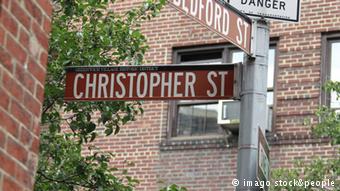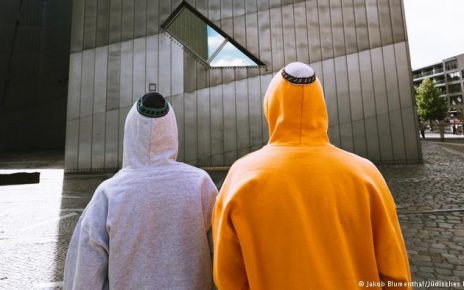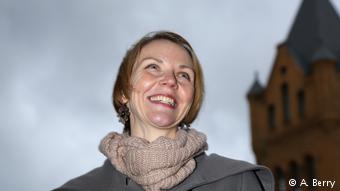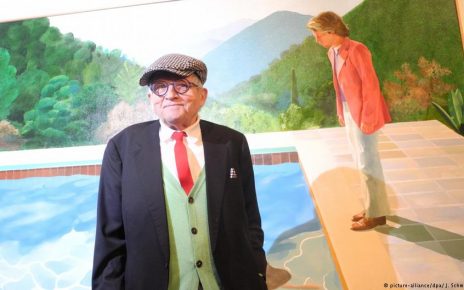Patricia is standing with her husband at a traffic light in central Berlin. All of a sudden, a man next them says: “You should be shot — you shouldn’t be alive.”
Patricia can’t believe her ears. She thinks she must have misheard, so she asks him to repeat himself. He does: “You should be shot.”
Patricia is a transsexual woman. She was born a man, but surgery helped her to become on the outside what she always knew she was on the inside: a woman.
She says Berlin is the place she faces most discrimination. For her, this city — which is so often celebrated as one of the most open in the world, and presents itself as tolerant of all lifestyles — has lost some of its magic.
Memories of Stonewall
The motto for the 40th Berlin Pride parade (also known as the Christopher Street Day or CSD parade) is “My body, my identity, my life.”
That of course refers to the long struggle for equality and acceptance by the LGBTTIQ (Lesbian, Gay, Bisexual, Transsexual, Transgender, Intersex and Queer) community. It is also a reference to people like Patricia, who experience exclusion and hostility because they don’t appear to fit into the heteronormative picture of society.

Pride is referred to in many European countries as “Christopher Street Day.”
The Stonewall riots were a series of the demonstrations by the gay community in late 1960s Manhattan that are widely thought to have kick-started the modern movement for LGBT+ rights. They were named after the Stonewall Inn, a gay bar located on Christopher Street.
On the 10th anniversary of the demonstrations, the then relatively small Berlin gay community wanted to mark the occasion. Bernd Gaiser, who is now 73 years old, was one of the founders of that first Berlin Pride.
Hitting the mainstream
Back then 400 gay and lesbian Berliners took to the streets. Today, there will be nearer to 400,000 — partly because the parade has to some extent hit the mainstream.
And yet Gaiser still finds himself being asked if a Pride event is still necessary in Germany, particularly after gay marriage was passed into law.
But even today, homosexuality is not universally accepted, Gaiser believes. Even in Germany’s capital city, transsexuals are often treated like second-class citizens.

Bernd Gaiser, a founder of Berlin CSD, is still fighting for queer rights
“Four decades after the first Berlin Pride, lesbians, gays, bisexuals, trans- and intersex people are still fighting for their rights,” says Berlin’s Senator of Culture, Klaus Lederer, who will open this year’s CSD event. It seems that acceptance and equality are still not a given.
This is also made clear in the 11 demands laid out by those who took part in the CSD Forum ahead of the parade. These include bringing the family and birth rights of same-sex couples into line with those of heterosexual couples, and scrapping the 1980 Transsexuality Law which governs a transsexual person’s rights to change their name or legal gender.
The group also calls on the Senate of Berlin to make a stronger case for LGBT+ rights in partner cities like Istanbul, Moscow and Warsaw.
Just a big party?
In its 40th year, the heart of the Berlin Pride event, the main parade, will be more political than ever. This is a response to persistent criticism that the CSD movement is more focused on partying than politics.
Of course this year, as with every other year, the parade will be bursting with color and loud costumes, but the festivities will be punctuated by announcements highlighting the aforementioned 11 demands.

Around 400,000 people are expected at this year’s Pride celebrations in the German capital
When Bernd Gaiser and his group marched through Berlin in 1979, they demanded the abolition of Article 175 of the penal code that made sexual acts between men punishable by law. They were successful, and those who were criminalized under it have had their convictions overturned and been offered compensation.
According to Jan Noll, the Editor-in-Chief of Berlin’s queer magazine Siegessäule, this is a sign of how far they have come in the fight for equality.
On the other hand, he observes, there has been a dangerous radicalization in public discourse, not least of all due to the emergence of the right-wing AfD (Alternative für Deutschland) party. Over the past year, the gay anti-violence project Maneo counted 324 assaults motivated by homophobia or transphobia in Berlin alone — that’s more than ever before.
“Our hard-fought rights have never felt more vulnerable than this year,” Noll says. There has been a sociopolitical “rollback” – and in such a climate, the rights of minorities are the first to suffer.
-
One photographer and 200 naked men fighting for diversity
Y. – Tailor, French
“My father was born between the two World Wars. I never told him about my sexuality. I never told my mother, either. I studied medicine. After graduation I fell in love with a man … my family thought that he was my best friend. Unfortunately, he died 16 years later. I work as a tailor now. I’m happy that nowadays in France men can marry other men. I think it should have been possible long ago.”
-
One photographer and 200 naked men fighting for diversity
J. – Shop Attendant, Spanish
“I grew up in a Spanish village. I was bullied a lot in school. When I was about 13, an older boy approached me while I was sitting on my bench, reading. He told me ‘You’re filthy!’ And the next thing you know, he poured a bottle of chocolate milk on me. I was shocked. I just stood there, all wet, while the ones around me laughed and looked at me as if I had been a monster.”
-
One photographer and 200 naked men fighting for diversity
S. – IT Project Manager and Massage Therapist, German
“It was much harder for me to deal with my father’s reaction. He started to yell at me, making it clear that I, as his son, would always be welcome, but my boyfriend wouldn’t be allowed in the house. I could not breathe. I cried … I stopped contacting him for eight years, and later, thanks to his wife, except for my first boyfriend, all my boyfriends would join me for visits.”
-
One photographer and 200 naked men fighting for diversity
A. – Fashion Designer, Spanish
“I am not invisible. Or am I? I work in a very ‘machista’ environment. And even though nobody bullies me personally, I see what happens to the younger, more effeminate gay guys I work with. What does ‘masculine’ mean? Do we all have to be young and strong? Do we all have to be muscular? Are we just an object of desire?”
-
One photographer and 200 naked men fighting for diversity
D. – IT Manager, Belgian
“When I was living at home with my parents, I worked night shifts at the local bakery. Three days after I had come out to my parents, I drove back home and went to sleep in the early morning. My mother walked into my room all freaked out and asked ‘Who did you tell you’re that way?’ Somebody had written the word ‘homo’ on the hood of my car … I took it as a badge of honor.”
-
One photographer and 200 naked men fighting for diversity
M. – Rugby Player, Spanish
“When people discover I am bisexual, a common reaction is to tell me how lucky I am, because I have a whole world of possibilities to choose from. However, reality is quite different and being bisexual has often been an obstacle for a relationship. Frequently, I am questioned when was the last time I was with a girl, as if I had to prove that I am still what I am.”
-
One photographer and 200 naked men fighting for diversity
D. – Actor, Dancer and Director, Romanian
“I was in a supermarket with my boyfriend. We were going to the movies, so we bought two bottles of water, some snacks and a chocolate. And we were queuing, waiting to pay. Suddenly, behind me I hear: ‘Gay, Gay!’ I could have told him lots of things. But I kept my calm, since this type of behavior often leads to violence.
-
One photographer and 200 naked men fighting for diversity
S. – Illustrator, Spanish
“One night, I was in a park in Coruna, talking to a friend. Suddenly, seven hooded guys surrounded us, started to beat us up and call us ‘faggots.’ We fought back, but during the quarrel, one of the guys stabbed me in the back twice.”
-
One photographer and 200 naked men fighting for diversity
D. – Sales Manager, Italian
“I’ve always been a ‘fatty.’ I became hairy at 14. Kids at school would often make fun of me. Growing up in a small Italian town, I never declared my sexual orientation. At 30, I left Italy to live in France, in the perspective of a better gay life. One day I had a sort of crisis and I waxed my entire body. I was so sad. Today I try to accept myself and be happy with the body I have.”
-
One photographer and 200 naked men fighting for diversity
C. – Shop Supervisor, Spanish
“I went to the movies with my sisters, mother and aunt to see ’50 Shades of Gray’. When the movie ended, two girls between 20 and 25 years called me ‘faggot’ out of the blue … I didn’t think that people still do that in 2018. Especially young people. My younger sister confronted them. A young straight couple also told them off and threatened to call the police. The girls ran away.”
-
One photographer and 200 naked men fighting for diversity
S. – Actor, French
“Abroad. Eastern Europe. I was staying in a very old woman’s apartment, in a poor faded tower of a grey suburb. She invited her grandson for me to meet. We drank vodka. Lots of vodka, directly from the bottle. He started to talk about what a family is and should be. ‘Faggots. They all should die.’ What do I think about that? ‘I don’t know,’ I said (lying). ‘I never really thought about them'”
-
One photographer and 200 naked men fighting for diversity
Tiberiu Capudean, Romanian photographer and LGBT activist
“The fact that the men are naked in these pictures is the least important aspect. My aim was to show that diversity is something normal, whether it comes to sexual orientation, body shape, age or race.”
Author: Lavinia Pitu





















